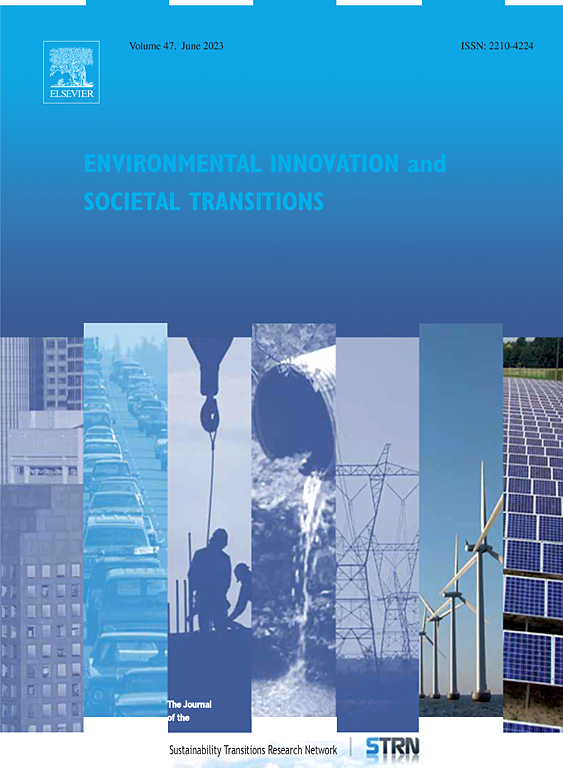Framing the limits to growth: Narratives in the sustainable fashion industry
IF 5.7
2区 经济学
Q1 ENVIRONMENTAL SCIENCES
Environmental Innovation and Societal Transitions
Pub Date : 2024-10-17
DOI:10.1016/j.eist.2024.100923
引用次数: 0
Abstract
While there is growing research about the roles of organisations in the transition to a post-growth society, activities in the market economy and the roles of businesses have received little attention so far. In this study, we address this gap by exploring the extent to which post-growth aspects have been considered by sustainability-oriented SMEs in the German speaking fashion industry. By drawing on the concepts of alterity and socio-technical niches, we analyse the framing strategies the companies use to position their alternative approaches in the context of the growth debate. We identify two narratives that show different degrees of oppositionality towards the established “mainstream” practices of the fashion industry: the “grow when it's good” narrative and the “less (growth) is more” narrative. Despite their antagonistic perspectives towards the relationship between sustainability and growth, these narratives can play complementary roles in a post-growth transition. At the same time, they represent the opposite ends of a continuum rather than distinct categories, which underlines the multidimensional nature of businesses’ perceptions of growth.
构建增长极限:可持续时装业的叙事
尽管有关组织在向后增长社会转型中的作用的研究越来越多,但市场经济活动和企业的作用迄今为止却很少受到关注。在本研究中,我们通过探讨德语时尚产业中以可持续发展为导向的中小企业在多大程度上考虑了后增长问题,弥补了这一空白。通过借鉴 "改变性"(alterity)和 "社会技术利基"(socio-technical niches)的概念,我们分析了这些公司在增长辩论背景下定位其替代方法时所使用的框架策略。我们发现了两种叙事方式,它们在不同程度上反对时尚产业的既定 "主流 "做法:"有利就发展 "叙事方式和 "少(发展)就是多 "叙事方式。尽管这两种说法对可持续发展与增长之间的关系持对立观点,但它们可以在后增长时代的转型中发挥互补作用。同时,它们代表了一个连续统一体的两端,而不是截然不同的类别,这突出了企业对增长看法的多面性。
本文章由计算机程序翻译,如有差异,请以英文原文为准。
求助全文
约1分钟内获得全文
求助全文
来源期刊

Environmental Innovation and Societal Transitions
Energy-Renewable Energy, Sustainability and the Environment
CiteScore
13.60
自引率
19.40%
发文量
90
审稿时长
56 days
期刊介绍:
Environmental Innovation and Societal Transitions serves as a platform for reporting studies on innovations and socio-economic transitions aimed at fostering an environmentally sustainable economy, thereby addressing structural resource scarcity and environmental challenges, particularly those associated with fossil energy use and climate change. The journal focuses on various forms of innovation, including technological, organizational, economic, institutional, and political, as well as economy-wide and sectoral changes in areas such as energy, transport, agriculture, and water management. It endeavors to tackle complex questions concerning social, economic, behavioral-psychological, and political barriers and opportunities, along with their intricate interactions. With a multidisciplinary approach and methodological openness, the journal welcomes contributions from a wide array of disciplines within the social, environmental, and innovation sciences.
 求助内容:
求助内容: 应助结果提醒方式:
应助结果提醒方式:


